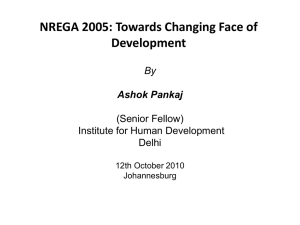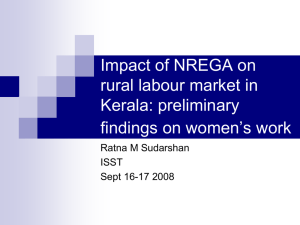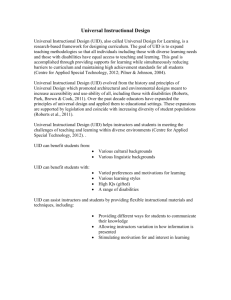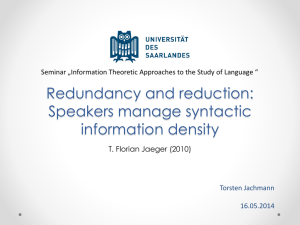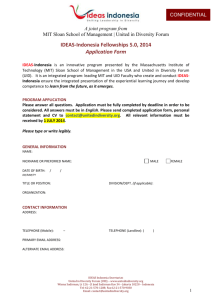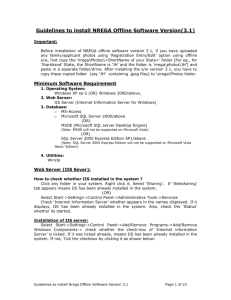The Impacts of Linking UID to NREGA Wage Payments
advertisement
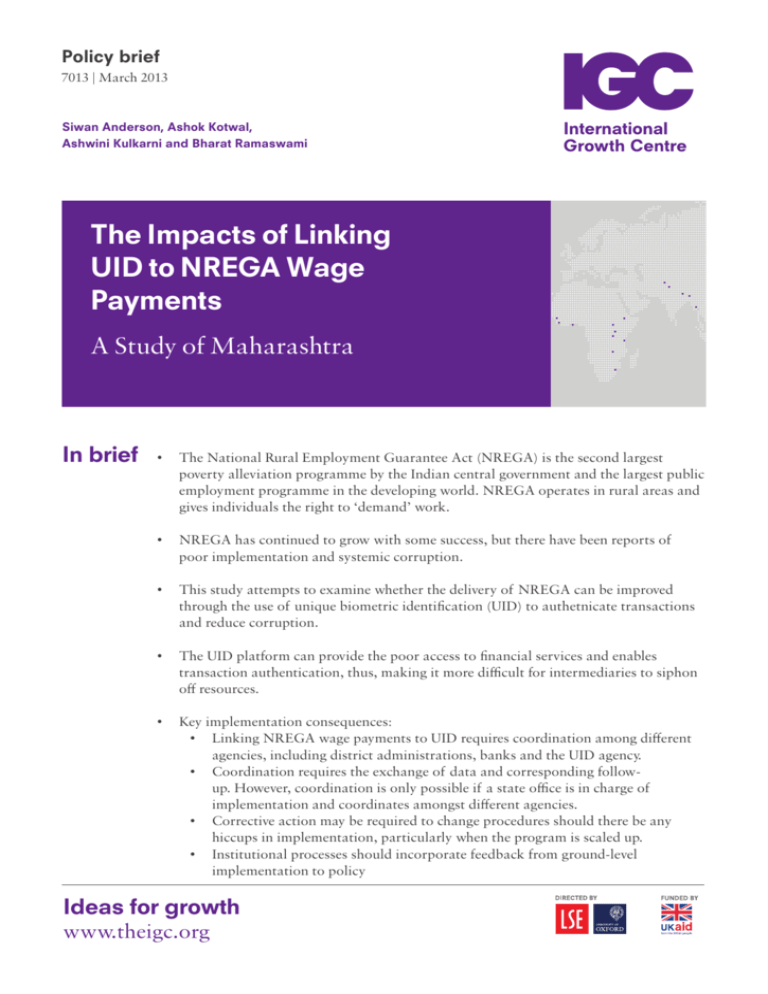
Policy brief 7013 | March 2013 Siwan Anderson, Ashok Kotwal, Ashwini Kulkarni and Bharat Ramaswami The Impacts of Linking UID to NREGA Wage Payments A Study of Maharashtra In brief • The National Rural Employment Guarantee Act (NREGA) is the second largest poverty alleviation programme by the Indian central government and the largest public employment programme in the developing world. NREGA operates in rural areas and gives individuals the right to ‘demand’ work. • NREGA has continued to grow with some success, but there have been reports of poor implementation and systemic corruption. • This study attempts to examine whether the delivery of NREGA can be improved through the use of unique biometric identification (UID) to authetnicate transactions and reduce corruption. • The UID platform can provide the poor access to financial services and enables transaction authentication, thus, making it more difficult for intermediaries to siphon off resources. • Key implementation consequences: • Linking NREGA wage payments to UID requires coordination among different agencies, including district administrations, banks and the UID agency. • Coordination requires the exchange of data and corresponding followup. However, coordination is only possible if a state office is in charge of implementation and coordinates amongst different agencies. • Corrective action may be required to change procedures should there be any hiccups in implementation, particularly when the program is scaled up. • Institutional processes should incorporate feedback from ground-level implementation to policy Ideas for growth www.theigc.org Motivation for Research “Total transfers from the Central government amount to at least 2% of GDP” India undertakes substantial transfers to the poor under various programs. Total transfers from the Central government amount to at least 2% of GDP. Transfers to the rural poor come in various forms; either as direct subsidies (like the PDS), or via the implementation of government programs administered through the Panchayat system. The National Rural Employment Guarantee Act (NREGA) is the second largest poverty alleviation programme of the Central government. This program extends across the country and is the largest public employment program in the developing world (Ambasta et. al. 2008). NREGA operates in rural areas and gives individuals the right to `demand’ work. The government has the obligation to start public works involving manual labour to meet this demand and workers are paid accordingly. NREGA has been operational since 2006 with mild success. On the one hand the reach of the program continues to grow, however on the other hand, it is plagued by reports of poor implementation and systemic corruption (Vanaik 2008, Bhatia and Dreze 2006). The main policy question is how can government improve the delivery of the NREGA program. In this context, the government is in the process of implementing a nation-wide program to provide every citizen of India with a unique biometric identification (UID). The general idea is to provide a platform that can be used to authenticate transactions and hence reduce corruption. The research question posed in this project is whether and how UID improves the delivery of the NREGA program. Policy Impact If this work demonstrates the success of UID based payments, the government can draw on this evidence to shift NREGA payments to the UID platform. There could be wider impacts on the structuring of other subsidies as well if the introduction of UID enables direct transfers to bypass local bureaucracies thus reducing corruption. Audience There will be widespread interest among policy makers - in the Government of Maharashtra (which implements the program), the UID authority (that provides the UID platform), the Ministry of Rural Development (which finances NREGA), the banking sector (interested in social inclusion) and other in the other agencies who look to this experiment to restructure subsidies in other contexts. Policy brief 7013 | March 2013 International Growth Centre2 “The research question posed in this project is whether and how UID improves the delivery of the NREGA program” Policy Implications Provide access to financial services to the poor through the UID platform The UID platform enables authentication of transactions and therefore makes it difficult for intermediaries to siphon off resources. The UID platform requires the government to make payments through the Core Banking system. Taken together, the research establishes (a) the feasibility of electronic payment systems using biometric identification and (b) quantifies the advantages of e-payment systems for timeliness of payments and in reduction of corruption. Implementation • Linking NREGA wage payments to UID requires coordination among different agencies: district administration, banks and the UID agency. • Coordination would require exchange of data and corresponding follow-up. Coordination is only possible if there is a state office that is expressly in charge of implementation and that coordinates among these agencies. • If there are hiccups in implementation (which is likely when the program is scaled up), corrective action may be required to change procedures. Therefore institutional processes are also required to incorporate feedback from groundlevel implementation to policy. Dissemination “The UID platform enables authentication of transactions and therefore makes it difficult for intermediaries to siphon off resources.” Policy brief 7013 | • • • • • • • Minister of Rural Development, Jairam Ramesh - jairam54@gmail.com Officer on Special Duty to Minsiter, Varad Pande, - varadpande@gmail.com DK Jain, joint Secretary NREGA - dkjain@nic.in Nandan Nilekani, Chairperson UID Authority of India Director UID Authority Maharashtra, Ajay Kumar Panda, abpandey@gmail.com Member Planning Commission, Mihir Shah - mihir.shah@nic.in Principal Secretary, EGS Department (NREGA) Government of Maharashtra, V. Giriraj March 2013 International Growth Centre3 Further Readings Farzana Afridi, Does political reservation for women improve programme delivery? http://www.ideasforindia.in/profile.aspx?id=21, January 2013 Chandrasekhar Bhuyan, Animesh Ghosh, Kshovan Guha, Dipti Pridhi Kindo, Priyanka Kumari, Ankush Singh, Sushma Taywade, Sweta Trayambak: Use of technology to improve public service delivery , http://www.ideasforindia.in/Article. aspx?article_id=102, February 2013 Saloni Chopra, Reetika Khera: Cutting delays in MNREGA wages http://www. ideasforindia.in/article.aspx?article_id=62, Oct 2012 Ashwini Kulkarni: Cash Transfers – through the Postal System or the Banks? http:// www.ideasforindia.in/article.aspx?article_id=85, December 2012 Abhiroop Mukhopadhyay, Mahatma Gandhi: National Rural Employment Guarantee Scheme: Falling demand or funds crunch? http://www.ideasforindia.in/ article.aspx?article_id=29, August 2012. Sandip Sukhtankar: Corruption and the Mahatma Gandhi National Rural Employment Guarantee Act, http://www.ideasforindia.in/article.aspx?article_id=1, July 2012 Policy brief 7013 | March 2013 International Growth Centre4 About the authors Siwan Anderson is an Associate Professor of Economics at the University of British Columbia. Before joining the department as faculty, she was an Assistant Professor at the University of Tilburg from 1999 to 2002. She has also held research positions at the University of Melbourne in Australia and the University of Namur in Belgium. Dr. Anderson is an affiliate of the Bureau for Research and Economic Analysis of Development. Her research interests are in development economics, applied microeconomics and the economics of gender. Ashok Kotwal is a Professor of Economics at the University of British Columbia. He has served as the Head of the Department and as the Director, Centre for India and South Asia Research at the University of British Columbia. His research has focused on development issues such as: the process of poverty decline, labour and credit markets in developing countries, the role of agriculture in development, the role of international trade, and rural governance. He has been engaged in the study of poverty alleviation schemes such as Public Distribution System and MGNREGA. Ashok is also the Editor-in-Chief of Ideas for India, the India Central programme’s economics and policy portal. Ashwini Kulkarni belongs to the Civil Society organisation Pragati Abhiyan based in Nashik. She has been associated with rural poverty related programmes for two decades. Pragati Abhiyan works with tribal villages of Nashik district and is also involved in research and policy work. Bharat Ramaswami is a Professor at the Indian Statistical Institute . March 2013 International Growth Centre6 Policy brief 7013 | About the authors Siwan Anderson is an Associate Professor of Economics at the University of British Columbia. Before joining the department as faculty, she was an Assistant Professor at the University of Tilburg from 1999 to 2002. She has also held research positions at the University of Melbourne in Australia and the University of Namur in Belgium. Dr. Anderson is an affiliate of the Bureau for Research and Economic Analysis of Development. Her research interests are in development economics, applied microeconomics and the economics of gender. Ashok Kotwal is a Professor of Economics at the University of British Columbia. He has served as the Head of the Department and as the Director, Centre for India and South Asia Research at the University of British Columbia. His research has focused on development issues such as: the process of poverty decline, labour and credit markets in developing countries, the role of agriculture in development, the role of international trade, and rural governance. He has been engaged in the study of poverty alleviation schemes such as Public Distribution System and MGNREGA. Ashok is also the Editor-in-Chief of Ideas for India, the India Central programme’s economics and policy portal. Ashwini Kulkarni belongs to the Civil Society organisation Pragati Abhiyan based in Nashik. She has been associated with rural poverty related programmes for two decades. Pragati Abhiyan works with tribal villages of Nashik district and is also involved in research and policy work. Bharat Ramaswami is a Professor at the Indian Statistical Institute . March 2013 International Growth Centre7 The International Growth Centre (IGC) aims to promote sustainable growth in developing countries by providing demand-led policy advice based on frontier research. Find out more about our work on our website www.theigc.org For media or communications enquiries, please contact mail@theigc.org Follow us on Twitter @the_igc International Growth Centre, London School of Economic and Political Science, Houghton Street, London WC2A 2AE Designed by soapbox.co.uk The International Growth Centre (IGC) aims to promote sustainable growth in developing countries by providing demand-led policy advice based on frontier research. Find out more about our work on our website www.theigc.org For media or communications enquiries, please contact mail@theigc.org Follow us on Twitter @the_igc International Growth Centre, London School of Economic and Political Science, Houghton Street, London WC2A 2AE Designed by soapbox.co.uk
